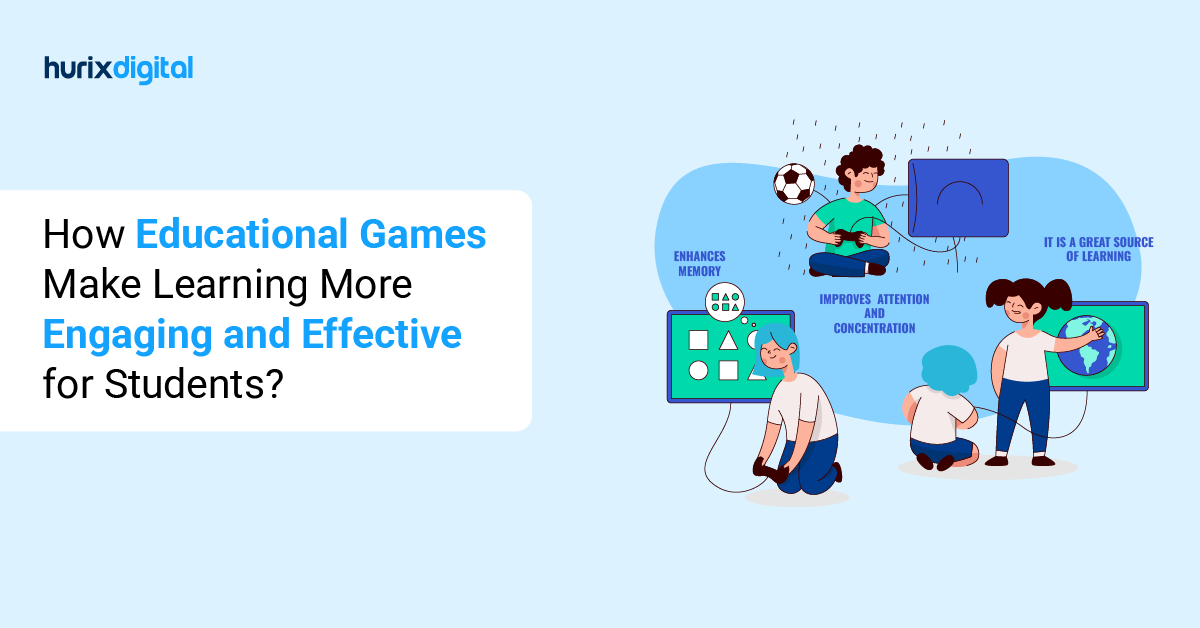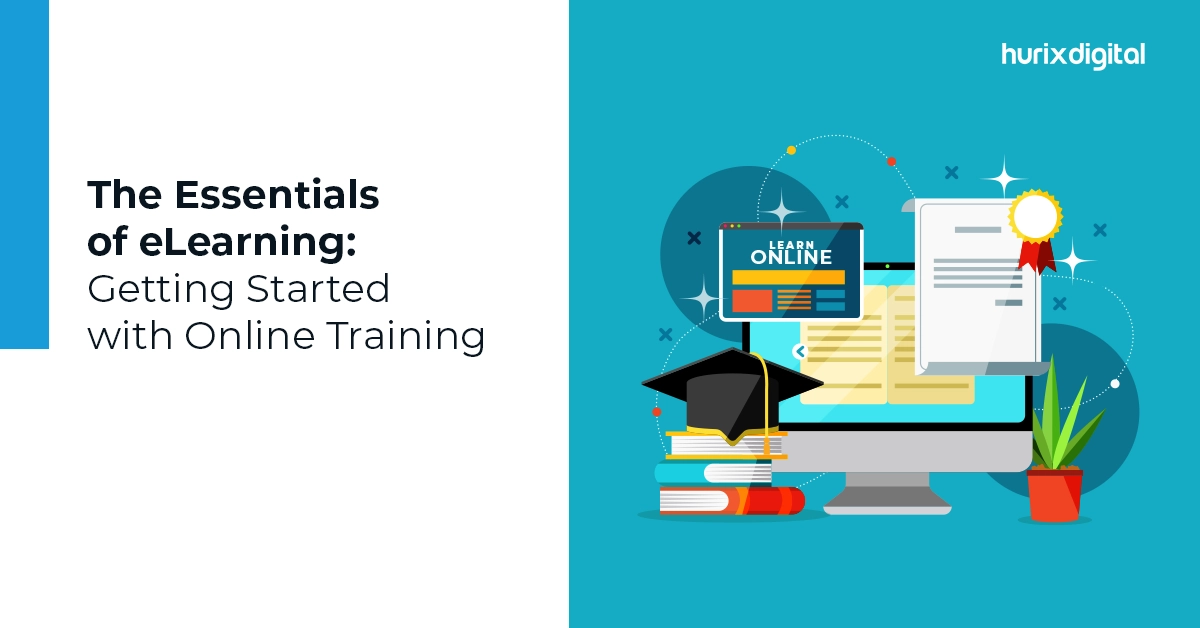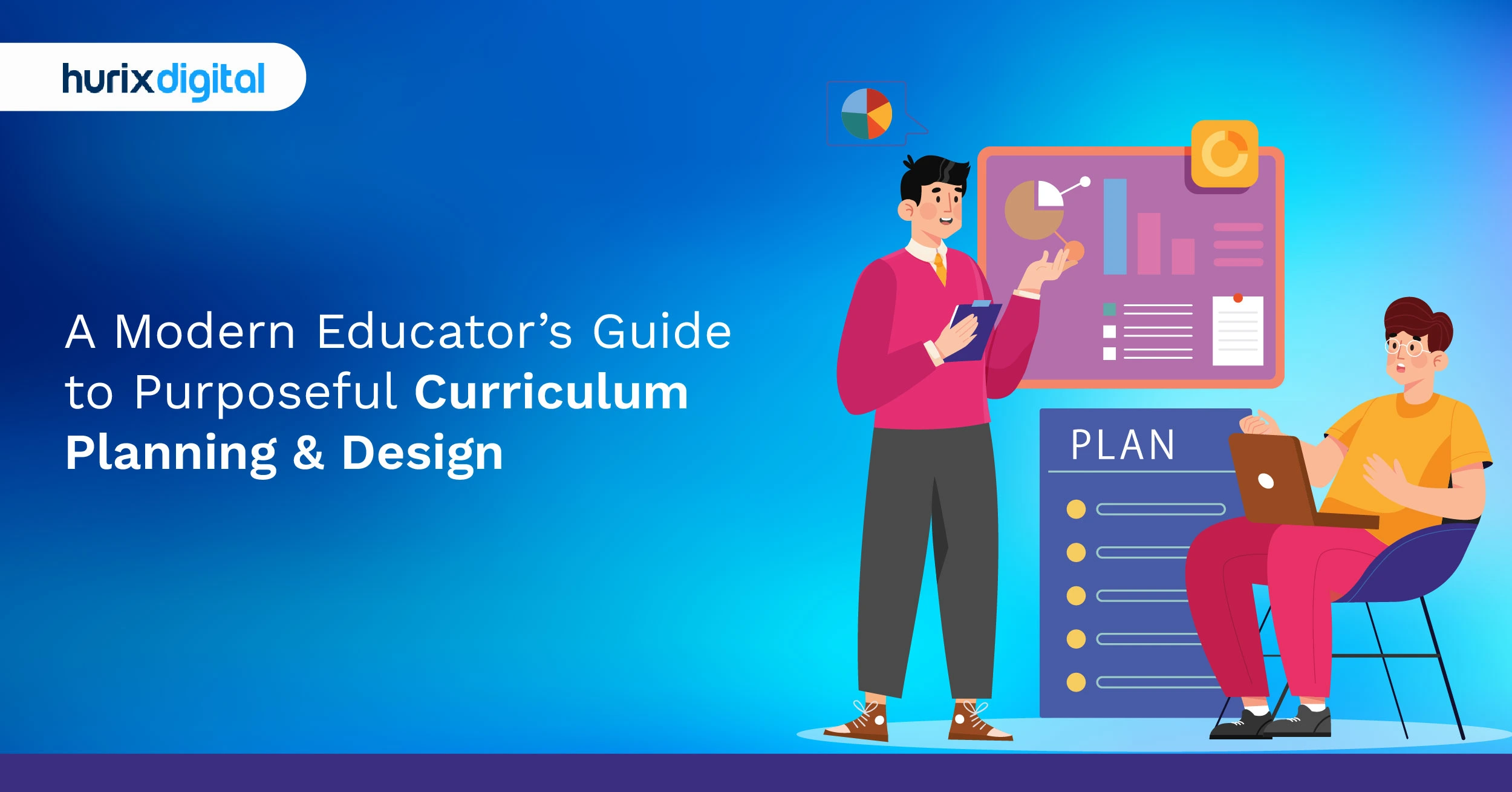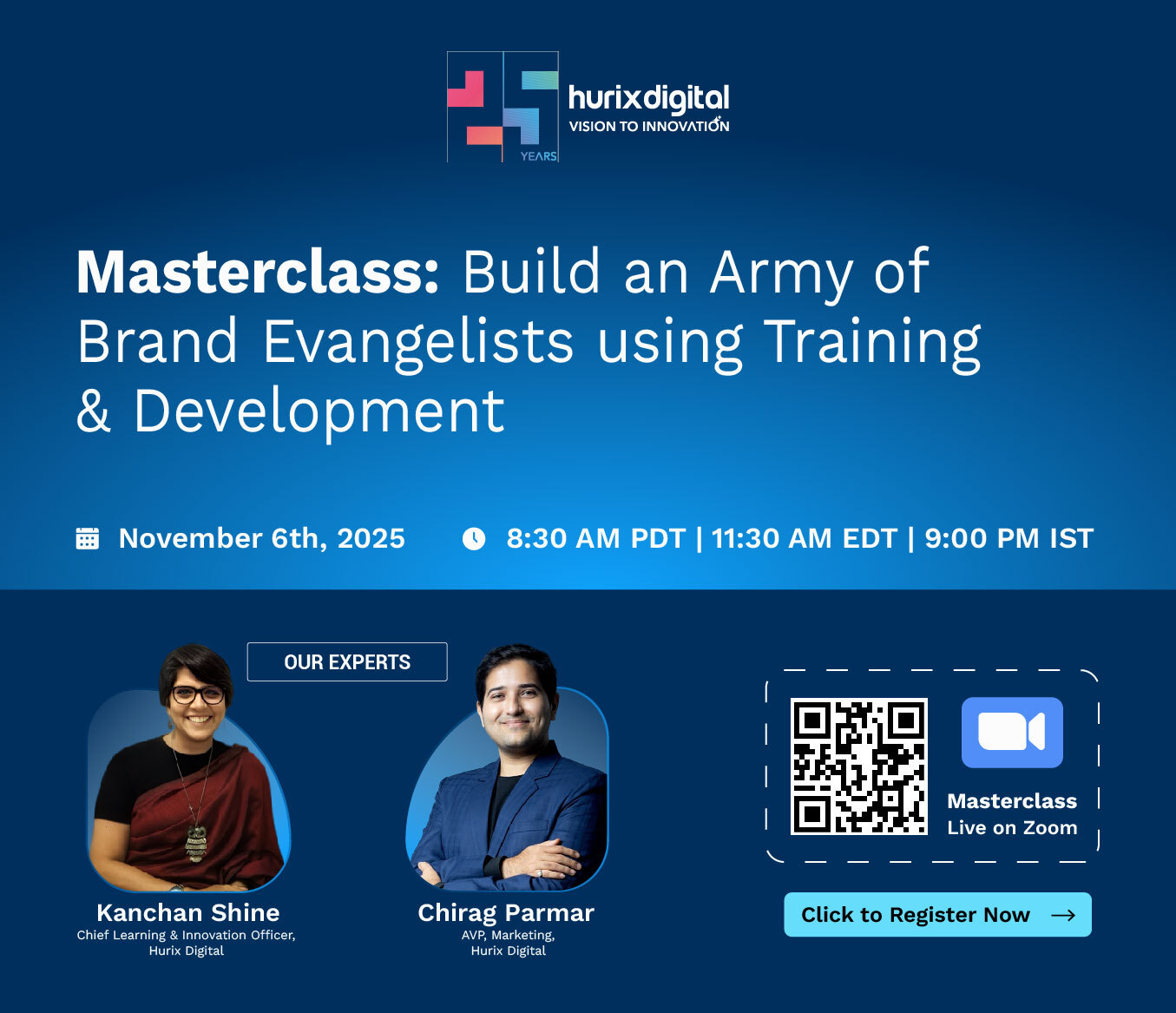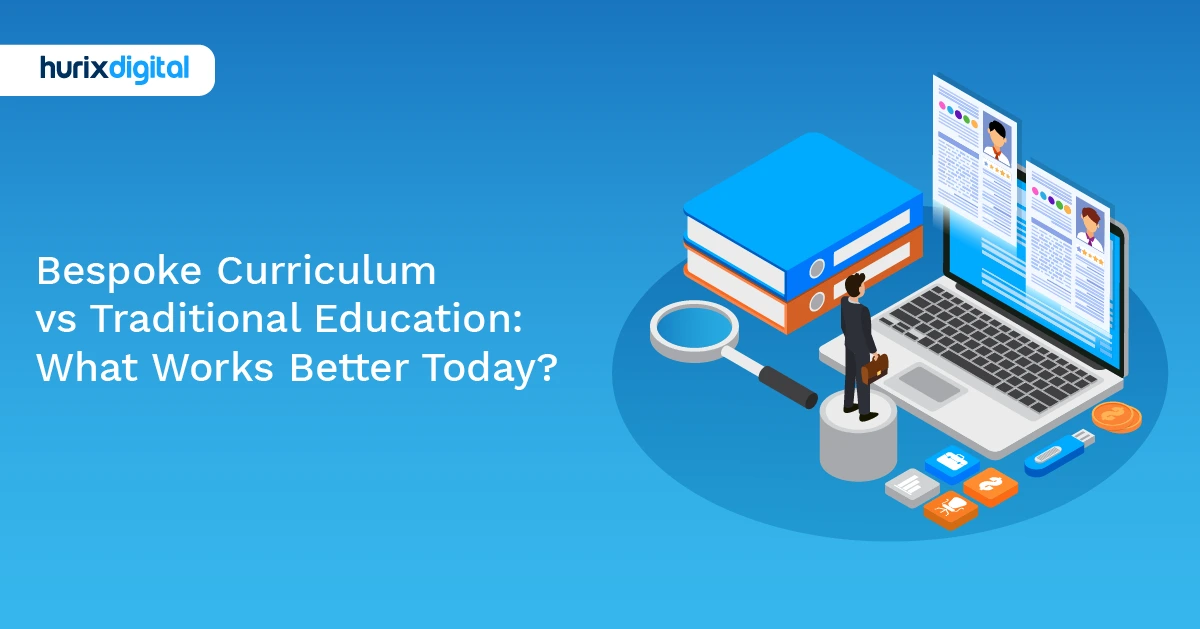
Nitin Sharma
July 12, 2025
Bespoke Curriculum vs Traditional Education: What Works Better Today?
Summarize with:
Table of Contents:
- What is Bespoke Learning?
- What is Traditional Education?
- Differences Between Bespoke Learning and Traditional Education
- Essentials for Development and Implementation of Bespoke Learning Strategies
- Benefits of Bespoke Learning for Educators
- The End Note
What is Bespoke Learning?
Bespoke learning is a modern educational approach that focuses on personalizing learning content. Instead of following a one-size-fits-all model, bespoke digital learning caters to the unique needs of learners in schools and universities, making their learning experience customized and relevant.What is Traditional Education?
Traditional education focuses on delivering an off-the-shelf learning experience. In this conventional educational setting, students sit in a classroom while a teacher delivers a lecture. The lecture follows a standard syllabus determined by a preset curriculum without any consideration for the unique learning needs of students.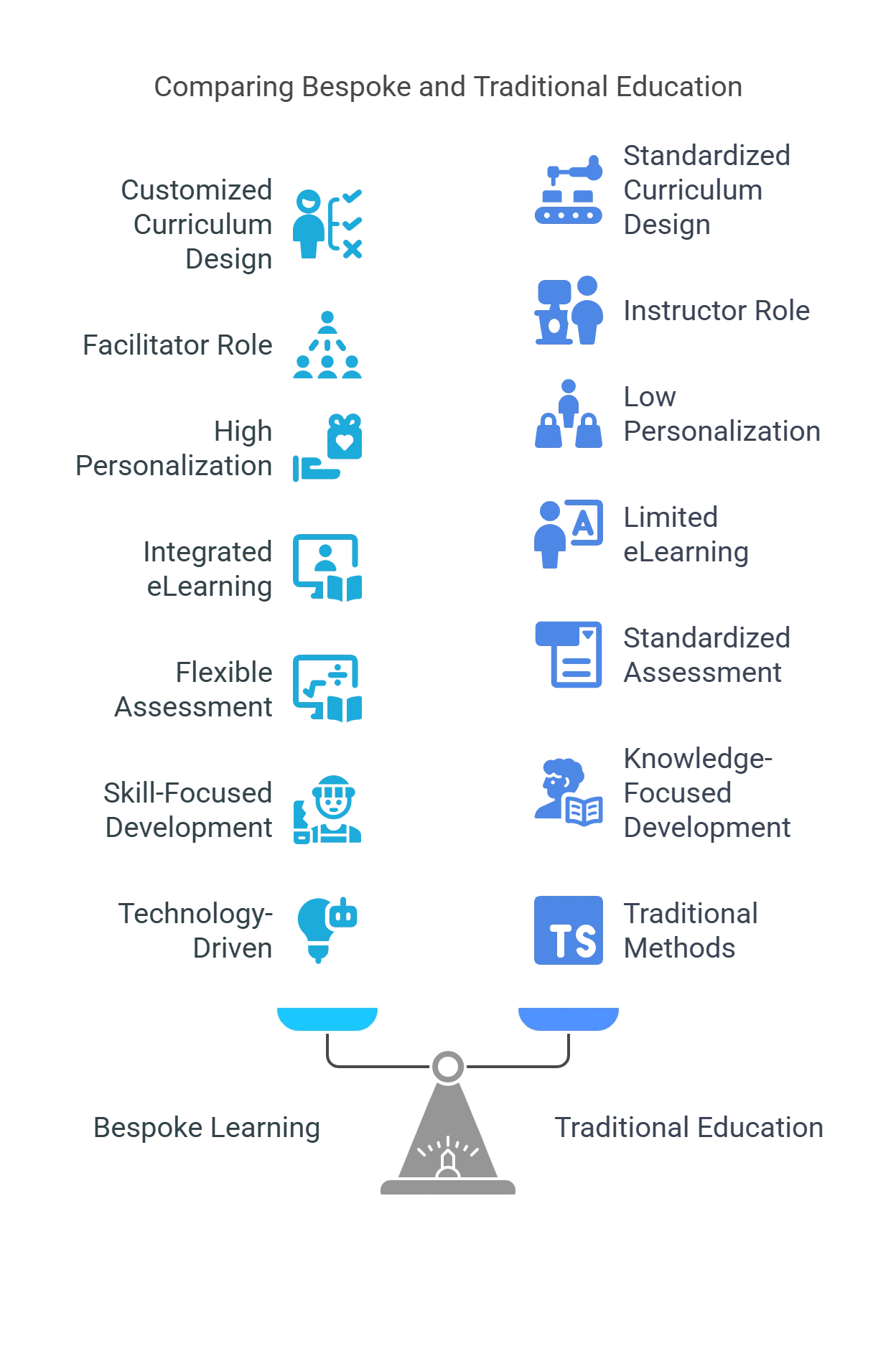
Differences Between Bespoke Learning and Traditional Education
Bespoke digital learning and traditional education differ from each other in many ways. Let’s explore each one so you can gain a better understanding of their differences.1. Curriculum Design
In traditional education, the curriculum follows a standardized design established by educational authorities. This design covers various subjects to foster well-rounded academic development for students. On the other hand, with bespoke eLearning, the curriculum design is very flexible. It allows for individual learning needs and preferences, enabling students to explore and delve deeper into subjects that they find interesting.2. The Teacher’s Role
In traditional education, the teacher assumes a key role and imparts knowledge to the students, who act as passive learners. In this case, the interaction between the teachers and students is limited. In the case of bespoke learning, the teacher acts as a facilitator for students, who play an active role in the learning process. Teaching approaches like collaborative learning and group learning, consisting of discussions and projects, allow for a great degree of interaction among the students and between the teacher and students.3. Degree of Personalization
Traditional education follows a one-size-fits-all learning approach, with the same syllabus, textbooks, and teaching methods for students. As a result, there is a very limited to zero degree of personalization in this conventional form of education. Conversely, bespoke learning incorporates personalized learning. It considers students’ interests, strengths, and learning needs and allows them to study independently on their preferred devices. Students have varying learning styles: visual learners, auditory learners, and kinesthetic learners. Bespoke learning allows different learners to flourish by incorporating videos, audio, animated storytelling, and other multimedia elements to ensure no student feels neglected.4. Integration of eLearning Elements
With traditional education, integrating eLearning elements is limited to PowerPoint presentations and documentaries. In contrast, eLearning elements are expansively integrated with bespoke digital learning. It uses ebooks, game-based learning, and scenario-based learning to provide an engaging educational experience to students. In addition, bespoke learning uses micro-learning to deliver content, boosting students’ knowledge retention.5. Assessment Styles
Traditional education follows a summative assessment format. The assessments occur at set times in a classroom setting and measure what the students have learned up to a certain point. On the other hand, bespoke learning follows an interactive form of assessment. After completing a chapter unit, students can be evaluated through quizzes, case studies, etc. They can also visit and revisit the chapter modules and online tests as often as needed. Along with being convenient, the interaction with chapter content through engaging assessments improves comprehension and increases retention. Since bespoke learning provides students with flexibility for taking assessments, unlike traditional education, there is no set time or place.6. Skill Development
In traditional education, students must memorize theories and formulas to pass their exams. While this instills in-depth theoretical knowledge about different subjects, conventional learning fails to foster the development of important practical skills. Unlike this, bespoke eLearning content equips students with the ability to apply their knowledge of subject matters to real-life problems. By encouraging discussions and critical questioning, bespoke learning develops and enhances essential skills like critical and creative thinking, problem-solving, and more.7. The Role of Technology
Unlike traditional learning, where the role of technology is minimal, technology is integral to bespoke digital learning. Automating grading assessments and related feedback enables students to quickly gain insights into their subject-related strengths and weaknesses. Technologies like AI gather data and generate analytical reports about students’ performance, enabling teachers to modify their curriculum accordingly. AR and VR technology enable students to understand subject matter realistically in simulated environments and provide an immersive learning experience.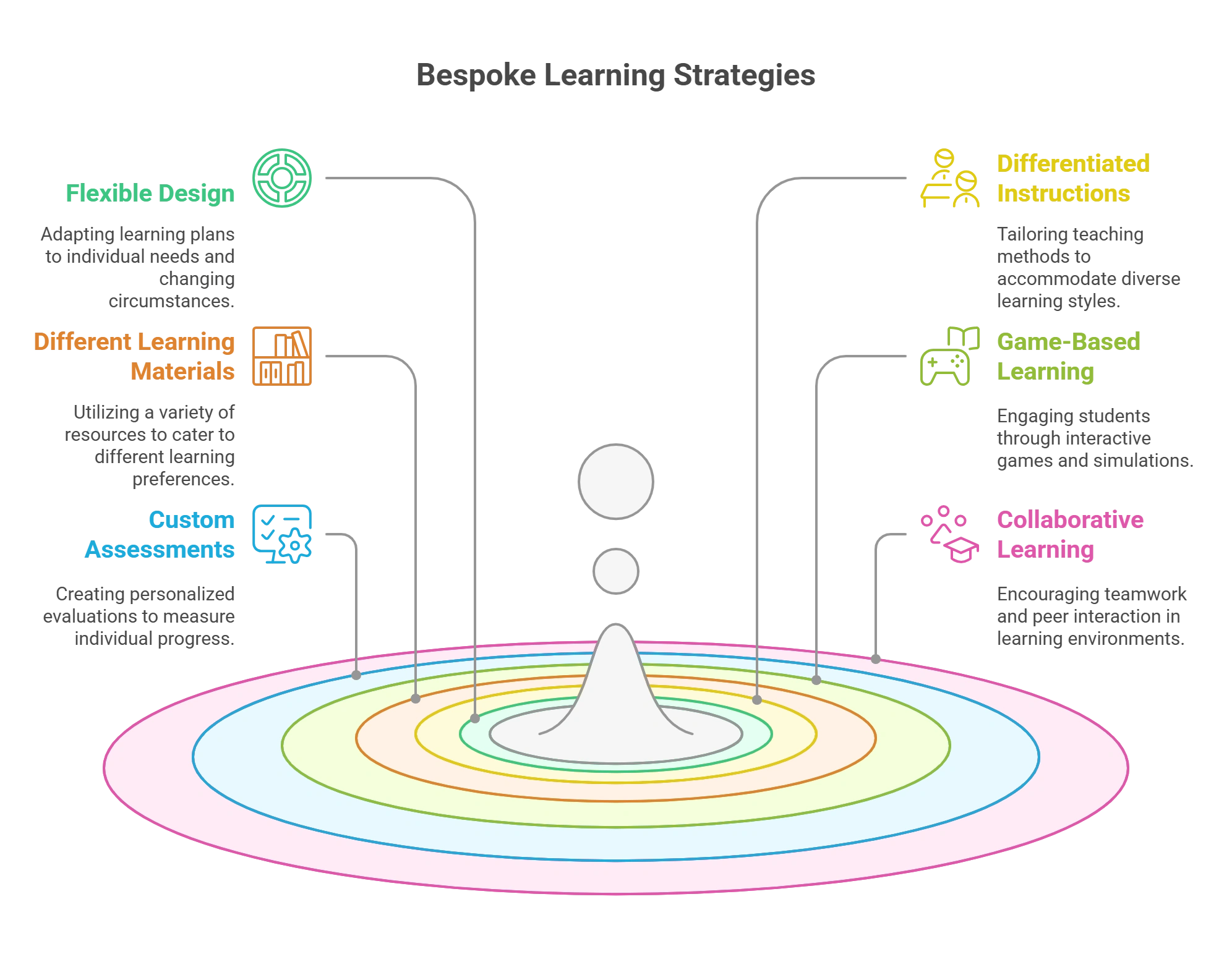
Essentials for Development and Implementation of Bespoke Learning Strategies
Reportedly, 21% (more than 20%) of educators consider bespoke or personalized learning to be a transformative approach that will improve the K12 curriculum. Bespoke learning strategies are thus key to forming a customized curriculum for the holistic development of K12 students. Mentioned below are some of the essentials that can help you develop and implement bespoke learning strategies in the K12 curriculum.1. Flexible Design
Away from the rigidity of traditional curriculum, bespoke learning strategies can give the curriculum a flexible design. How will this come about? First, you will need to understand the students’ interests and learning needs. To do that, you can conduct surveys and interviews. Once you have collected the information, you will need to analyze it. The analysis will help you understand students’ unique needs and identify their learning gaps. This knowledge will help your teachers formulate a bespoke curriculum design and individual learning goals.2. Differentiated Instructions
One student may prefer listening to a teacher, while another may prefer reading a textbook to understand a subject matter. Bespoke learning strategies allow for the existence of different modes of instruction in the curriculum. By implementing them, you can ensure the provision of three types of instructional learning:- Teacher-Directed Learning: This type involves a teacher delivering a lecture to the students.
- Self-Paced Learning: In this type, students use learning materials to study at their own pace.
- Blended Learning: This type is a mix of the above two types of instructional learning. It involves the students exploring topics by themselves and using the teacher-led classes to clarify their doubts and get feedback on their assignments.
3. Different Learning Materials
Some students prefer to learn by watching a video, some by listening to audio, and some by doing activities. Bespoke curriculum learning recognizes this and accommodates these different learning styles by incorporating e-learning elements into the curriculum. eLearning elements include videos, audio, animated storytelling, interactive ebooks, etc. The latter contains interactive components like the highlight tool, images, animations, graphs, add-on hyperlinked resources, and more, which students can access on any smart device.4. Game-Based and Scenario-Based Learning
Game-based and scenario-based learning are student-centric and thus important for crafting a customized curriculum. Game-based learning involves simulated games with defined learning goals that help students understand the subject matter in a fun and engaging way. Scenario-based learning involves applying theoretical concepts to different simulated scenarios. Both these learning strategies employ technologies like VR and AR to provide an immersive, captivating, and active learning experience.5. Custom Assessments and Feedback
Assessments and feedback are crucial components in the implementation of bespoke learning strategies. Assessments can be taken in two ways:- Formally, such as case study-based tests, quizzes, etc.
- Informally, such as class presentations, discussions, etc.
6. Collaborative and Inquiry-Based Learning
While student-centric learning activities are crucial, equally crucial is the incorporation of collaborative and inquiry-based learning into a bespoke curriculum. These two types of learning aid students in developing their practical skills. Collaborative learning involves assigning students group activities, such as presentations, projects, and research work. These activities build on and enhance their empathy, communication, and decision-making skills. Inquiry-based learning involves three things—observation, investigation, and discovery—for constructing knowledge. This learning emphasizes the need for critical questioning and encourages the conduct of scientific experiments and research projects. As a result, this learning fosters the development and enhancement of critical and creative thinking, research skills, problem-solving skills, and more among students.Benefits of Bespoke Learning for Educators
Bespoke learning improves the capability of educators to provide a better quality of education to students. Apart from this, there are various indirect benefits of bespoke learning:- It helps educators foster an in-depth understanding of the subject matter among students.
- It allows them to explore new instructional strategies.
- It enables them to instill curiosity and a love for learning in students.
- It allows them to invest their free time (resulting from a reduced workload) in other important activities, like developing a strong connection with students.
- It enables educators to cultivate a learning environment where students thrive, thus enhancing their job satisfaction.
The End Note
There is a significant difference between traditional and bespoke eLearning. Namely, the vast benefits of tailored learning programs. The global eLearning industry is projected to grow to $465 billion by 2028, marking this shift in education strategies. If you want to capitalize on this and improve learning outcomes, consider outsourcing bespoke eLearning solutions from companies like Hurix. Hurix Digital offers custom content solutions to meet the learning needs of your educational institution’s students. We provide eLearning elements like game-based, micro-learning, mobile learning, and more to help you deliver a rich and engaging learning experience. As a firm believer in improving learning outcomes, Hurix Digital is the trusted preference of companies like Wiley, McGraw-Hill, Cambridge University Press, and more. To know more about bespoke learning solutions, contact Hurix Digital.Summarize with:

Senior Vice President
A Business Development professional with >20 years of experience with strong capability to sell new solutions and develop new markets from scratch. New Market Entry Specialist with experience working in the largest emerging markets. Exceptional experience in conceptualizing, ideating and selling new learning technologies like VR AR, etc. across multiple industry verticals.
 Upcoming Masterclass | Build an Army of Brand Evangelists using Training & Development | November 6th, 8am PT | 9PM IST |
Upcoming Masterclass | Build an Army of Brand Evangelists using Training & Development | November 6th, 8am PT | 9PM IST |

